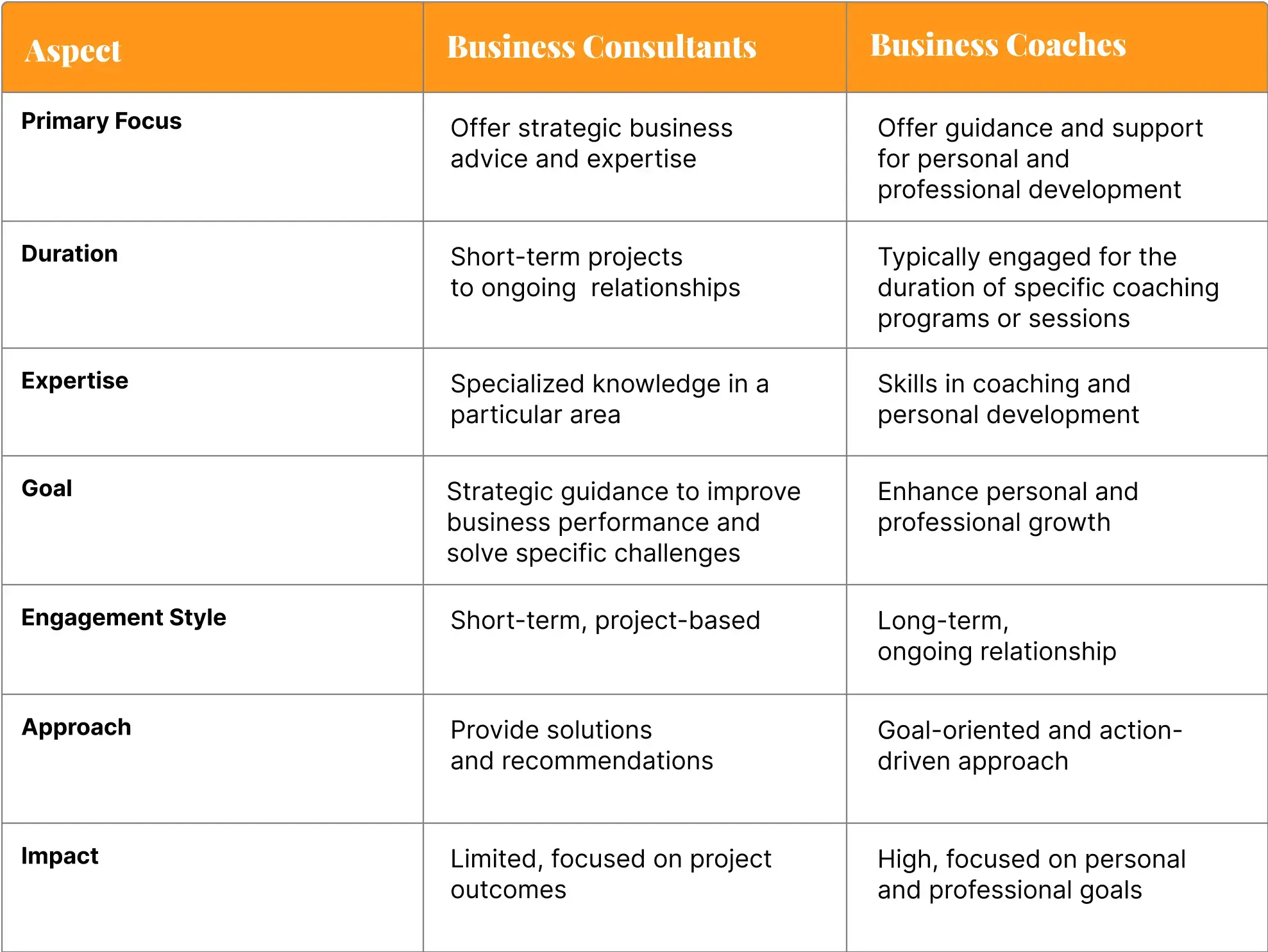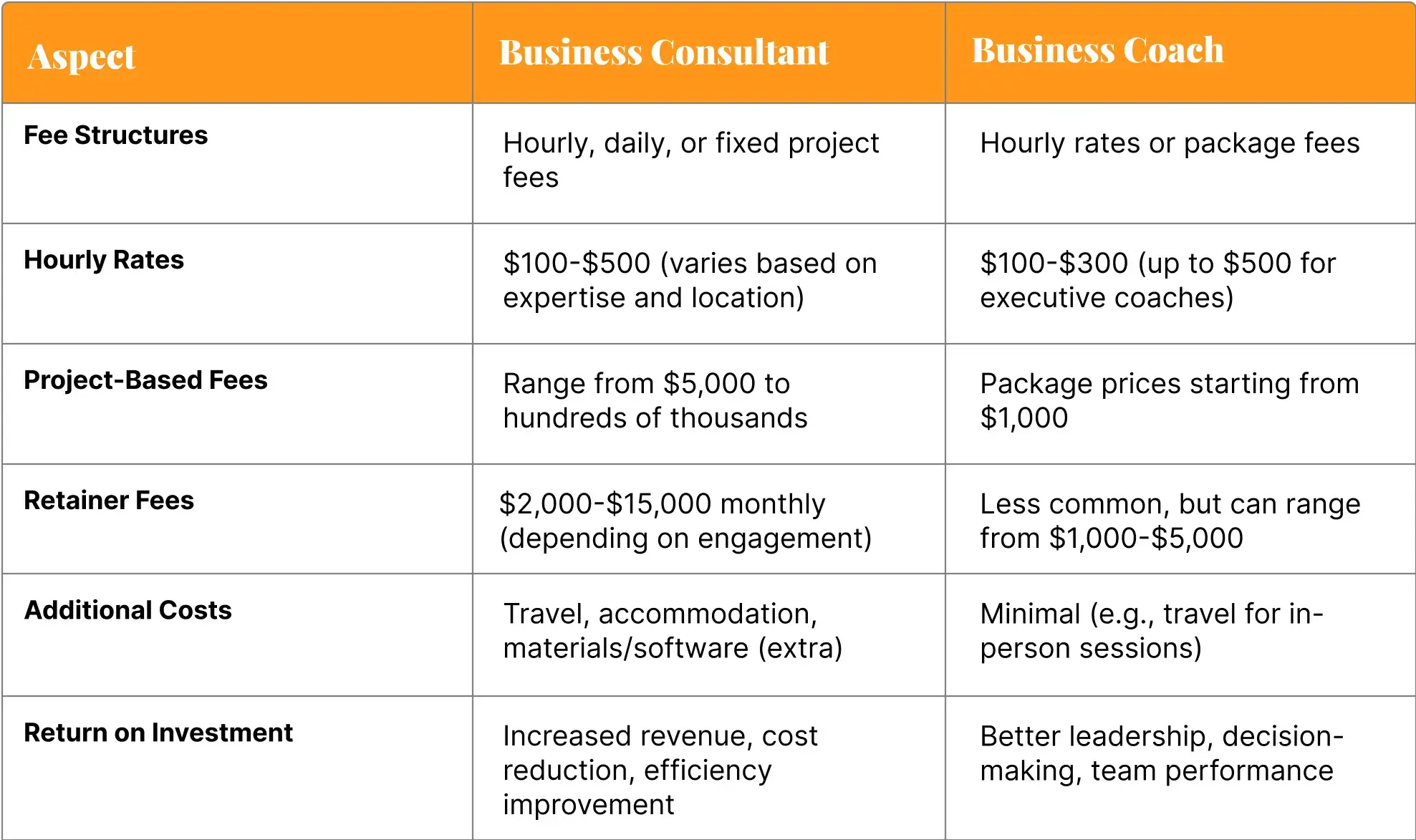– Business Consultant
When you require basic or professional advice on enterprise development or refining strategy, a consultant will be of great help. Besides suggesting possible prospects and risks, a business consultant will be impartial and analyze your current approach regarding its merits and demerits.
Apart from that, they help in implementation, creating structures, identifying metrics to be measured (there may be KPIs involved), and company integration. Consultants enable business efficiency by reducing risks and optimizing resource utilization, as well as creating a structure for monitoring progress.
Business consultants are specialists who help companies improve their performance, overcome specific difficulties, and accomplish objectives.
Core competencies of consultants include strategy formulation and execution, process mapping and redesign, change management, financial management, marketing and sales, human resources, information technology, risk management, supply chain management, sustainability, and corporate social responsibility.
Business consultants focus on identifying and enhancing organizational activities to improve effectiveness and productivity. They do this by mapping out current processes, determining what works well or poorly, and identifying areas for improvement.
Using methodologies such as Lean Six Sigma, consultants reduce unnecessary cycles, avoid redundancies, enhance productivity, and improve quality. They may also suggest new technologies or systems to improve current processes. Their objective is to assist your business in running more efficiently, minimizing expenses, and providing your clients with improved services or goods.
When a business evaluates a new market or potential market area for a product or service, consultants can offer guidance. These consultants offer important services related to market research and analysis, including potential expansion opportunities and their feasibility.
Participation strategies such as segmentation, branding, advertising, and promotion approaches are often recommended by experts to reach the intended market effectively. Consultants play a critical role in providing guidelines, especially regarding the laws and cultural nuances of the new market.
Consulting can be invaluable in facilitating the change process for organizations undergoing important transformations such as mergers, acquisitions, or structural changes. It gives recommendations on managing people’s side of change, encompassing their engagement, communication, and support throughout the process.
It is essential to develop and disseminate best practices for change management to lower resistance, boost utilization, or facilitate the adoption of new procedures. Consultants work closely with company leadership to ensure the change process is well-understood and effectively communicated throughout the organization.
-
Technology Implementation
Consultants can assist in implementing new technologies or systems, ensuring seamless integration with your existing processes. Based on the evaluation, consultants create an implementation strategy that defines the process by which the recent technology will be smoothly incorporated into the organization.
They also offer advice on which solutions to ensure the chosen technology suits your business needs. During the implementation, the consultants collaborate with the company’s staff to provide training, ensuring everyone is familiar with the new tools. With their expertise, they minimize disruptions and maximize the return on your technology investments.
Regarding efficient production, cutting costs, and boosting ROI, consultants are simply inimitable. These experts carefully study a company’s structure, activities, and expenses to identify areas of improvement.
By making recommendations and providing further support on how to draw up new contracts, redesign the organizational structure, or invest in new technologies, they assist companies in becoming more efficient.
Business consultants offer insightful programs for staff skill development and productivity enhancement. These initiatives are specially designed to meet the objectives and particular requirements of the company. Consultants start by evaluating the present skill levels and pinpointing any shortcomings or potential areas for development.
They then design and implement customized training sessions and courses to develop the required competencies. These programs can cover a wide range of subjects, such as teamwork, communication, technical skills, and leadership development.
– Business Coach
Is your company stagnating and unable to reach new heights? A business coach can provide fresh insights and solutions to uncover new growth opportunities. Whether the challenge is growth or expansion, a business coach will offer effective solutions, helping you overcome obstacles and revitalize your business for the long term.
A business coach is a professional who supports you in developing your leadership skills to become a better leader. They use teamwork to help you examine your strengths and weaknesses and provide tips on becoming. 1:1 sessions will facilitate the business coach’s equipping the client to improve communication, decision-making, and problem-solving as a leader for the team.
-
Improving Decision-Making
In any case of ambiguity or uncertainty, a business coach is beneficial in ensuring that the business owner has reasonable options and makes appropriate decisions. They offer a framework for rational thinking and analysis that allows you to identify the available options and their strengths and weaknesses and determine the possible consequences of your decisions.
The business coach can usually question you and give you feedback that helps open your eyes and help you see things from a different perspective. Thus, you will make decisions that are in line with your goals.
It is an effort to fulfill the needs of work and personal life without getting exhausted. A business coach can assist you to develop a work-life balance by assessing personal goals, establishing healthy practices, and managing schedules. This guidance helps you adopt a more sustainable approach to business and personal life, leading to better outcomes.
Productivity can’t be improved simply by working harder – it must be achieved through working smarter. A business coach will help you identify ways to maximize your efforts and achieve your goals faster effectively. They can also help you create systems and routines that promote long-term efficiency and improve your chances of achieving sustained success.
Among the most important aspects that one should develop in business is confidence. An effective business coach will provide the correct solutions to address the causes of low self-esteem.
They can advise you on practicing techniques for developing a sense of self-worth and confidence in one’s abilities—setting such tasks as targets and rewarding them, commenting positively on success in performing small tasks, and approaching life from a positive perspective.


